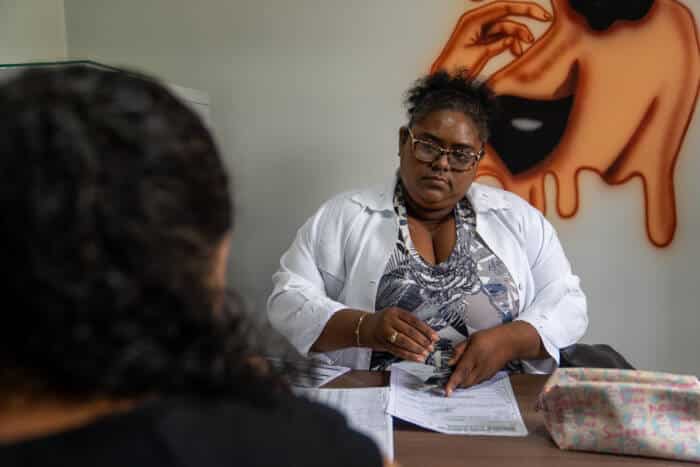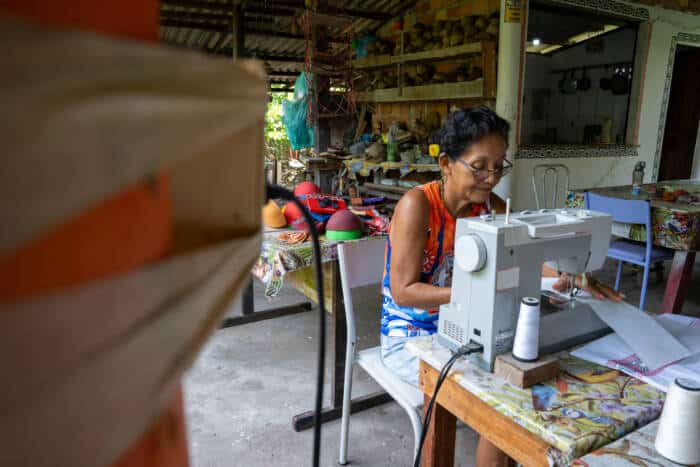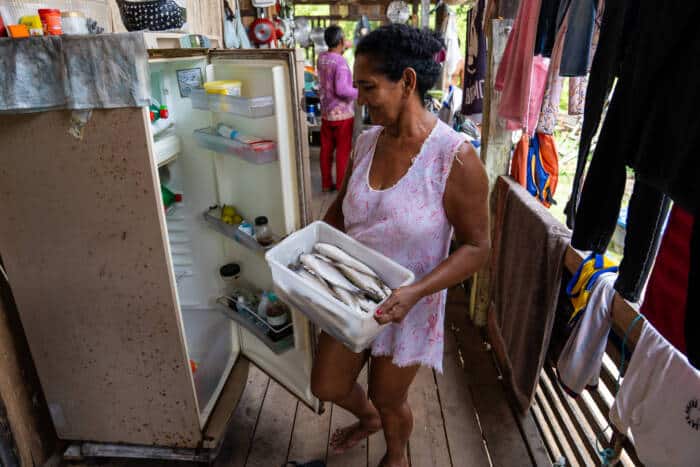The climate crisis is now
The world is running out of time. The UN has just warned that if carbon emissions aren’t cut down by 60% by 2030 we will most definitely fail to limit global heating to 1.5C, the critical threshold to prevent the worst impacts of the climate crisis. As we approach COP30, governments are currently aiming for a 10% reduction. The gap between what’s needed and what’s being done is dangerously wide.
Our carbon budget, the amount of CO₂ we can release before long-term global temperatures rise beyond 1.5°C, is also limited. At current emission levels, we could exhaust our remaining carbon budget within just two years. But we are not all equally to blame for this.
The wealthy few are exhausting our global carbon budget
Oxfam’s new report, Climate Plunder: How a powerful few are locking the world into disaster, reveals how the world’s super-rich are burning through the remaining carbon budget at shocking rates. The staggering scale of carbon inequality between the richest and the rest of the world is driving all of us deeper into crisis:
- Since 1990, the richest 1% have burned through 15% of the global carbon budget, more than the poorest half of humanity combined.
- A person from the richest 0.1% emits more carbon in a single day than someone in the bottom 50% emits all year.
- The investment emissions of just 308 billionaires exceed the combined emissions of 118 countries. If these billionaires formed a nation, they would rank as the 15th-largest emitter in the world.
The super-rich are deliberately locking humanity into crisis
The report also exposes how the wealthiest individuals are wielding their economic and political power to keep the world hooked on fossil fuels while they maximize their profits.
Nearly 60% of billionaire investments are in high-climate-impact sectors such as oil, gas, and mining. Two-thirds of these companies are not aligned with the 1.5°C target, while a third are operating in line with a 4°C future.
Just last year at COP29 in Baku, Azerbaijan, 1,773 fossil fuel lobbyists were granted access to negotiations, more than almost any national delegation. By contrast, only 180 participants represented Indigenous Peoples. This imbalance reveals how deeply the interests of major polluters are embedded in climate policymaking, while those most affected by the crisis remain sidelined.
The result is a dangerous cycle: the wealthiest continue to profit from destruction while communities on the frontlines face escalating climate disasters. Without urgent government action to rein in the power of the super-rich, global efforts to cut emissions and protect lives will remain out of reach.
Learn who these climate-crisis fueling billionaires are.
Extreme wealth comes at an extreme human cost
The emissions of the richest 1% are responsible for damages that reach far beyond rising temperatures. They translate into real human suffering, escalating climate impacts, and deepening social and economic crises.
Their pollution from just 2019 alone is projected to cause 1.3 million heat-related deaths this century. Over the past thirty years, their excess emissions have destroyed crops that could have fed 14.5 million people every year.
The economic toll is equally devastating. By 2050, the climate damage linked to the emissions of wealthy individuals and nations is expected to cost low- and lower-middle-income countries US$44 trillion in losses.
These numbers represent lost lives, livelihoods, and futures. They’re the price of a system that rewards pollution and punishes those least responsible for it.
COP30 needs to be a turning point
Governments at COP30 must now move beyond empty promises. It’s time to stop pandering to the super-rich, dismantle the political and economic systems that protect them, and start governing in the public interest. Ending the climate crisis means confronting the power and privilege driving it through:
1. Taxing the rich and the polluters
Taxing the richest is not radical, it’s only fair and logical. A wealth tax of up to 5% on multi-millionaires and billionaires could raise more than US$1.7 trillion every year, which is what is needed to fund a fair and just energy transition in developing countries. Governments must:
- Introduce progressive taxes on extreme wealth and back national and global wealth taxes on the mega-rich.
- Impose permanent, increased taxes on polluting fossil fuel corporations and eliminate tax loopholes that reward destruction.
These measures could generate hundreds of billions of dollars each year funds that should support the transition to affordable, renewable energy at home and in countries least responsible for the crisis, while strengthening public services such as healthcare, education, and social protection.

In the Brazilian Amazon, this money could mean electricity, which is life or death for Elisandra’s elderly mother-in-law who might need urgent care at night. Photo: Mariana Abdallah
2. Delivering systemic change
Fair taxation alone is not enough. Governments need to also address the political, social, and structural inequalities that have allowed a handful of actors to shape global climate and economic policy. They must act together to:
- Curb corporate and political influence by banning fossil fuel lobbyists from climate negotiations.
- Ensure fair participation of civil society, Indigenous peoples, and frontline communities in decision-making. This starts by trusting communities with the resources to lead their own solutions.
- Adopt fair-share national commitments that reflect historical responsibility and capacity to act.
- Build equitable economies that prioritize sustainability, decent jobs, and justice over profit.

For Dona Carminha, an artisan in Joanes, Brazil, a just energy transition means having light to continue her work. Photo: Mariana Abdallah
COP30 host, Brazil, must lead by example
As leaders gear up for COP30 in Belém, the Brazilian Amazon, the irony is hard to miss: 1 million people in the Amazon do not have access to energy.
High-voltage lines cross the forest to feed cities and industries, but skip the very communities beneath them. In the Quilombola territory of Ramal do Piratuba, just a few hours from Belém, people can see the towers overhead but still can’t rely on that same energy to store medicines or power a lightbulb. This is perverse and a failure of justice. Brazil and its Government must guarantee:
- Universal Renewable Energy Access – Guarantee full access to clean, renewable energy in all Amazonian territories treating electricity as a right, not a commodity.
- Affordable energy for all – Reform the national electricity social tariff to ensure affordability and fairness for low-income and traditional communities.
- Fair economic policy for the transition – Tax billionaires and invest at least R$1 billion per year in research, public renewable infrastructure, and professional training through public universities.
- Redirect climate finance for justice – Use public and international climate finance to strengthen community ownership, job creation, and energy democracy in the renewable sector.
- Adopt a national energy transition plan – Present a plan to phase out fossil fuels in the Amazon, expand renewable access by 2028, and guarantee sustained public investment in national renewable energy technology and workforce development.

For Dona Ivanil in Vila do Pesqueiro, climate finance means keeping fish fresh to feed their family. Photo: Mariana Abdallah
These measures go beyond policy options. They are moral imperatives and the rightful duties of our elected representatives.
Learn more about how 350.org is transforming energy policy and ensuring everyone has full access to renewable, democratic, and equitable energy through our latest campaign, Energy of the People.
We are calling for climate justice and fair finance at COP30
Want to know more about how governments can make billionaires and big polluters pay their fair share?
Join 350.org, Oxfam International, and the End Austerity Campaign for the UNFCCC side event “Securing Ambitious COP Outcomes and Future Finance for Climate Justice” on Tuesday, 11 November, 11:30–13:00, Side Event Room 9.
Together with frontline activists, civil society, and government leaders, we’ll explore how progressive taxation, fair climate finance, and people-powered renewables can hold the super-rich to account and secure a livable future for all. This COP must turn words into action.